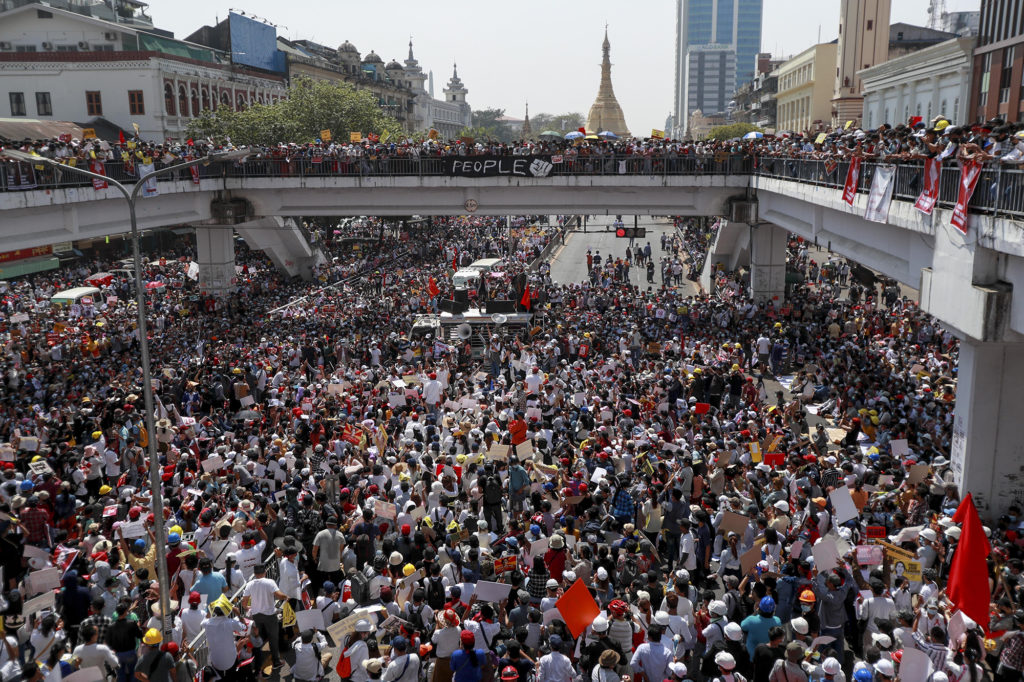
YANGON, Myanmar (AP) — Thousands of demonstrators flooded the streets of Myanmar’s biggest city Wednesday (Feb. 17), in one of largest protests yet of a coup, despite warnings from a U.N. human rights expert that recent troop movements could indicate the military was planning a violent crackdown.
In Yangon, protesters marched carrying signs calling for ousted leader Aung San Suu Kyi to be released from detention, while others feigned car trouble, strategically abandoning their vehicles – and leaving the hoods up – to prevent security forces from easily accessing the demonstrations. Large rallies were also held in the country’s second-biggest city, Mandalay, and the capital of Naypyitaw, in defiance of an order banning gatherings of five or more people.
One motorist, who spoke on condition of anonymity because he feared being targeted, explained tongue-in-cheek that his car had broken down “due to the suffering that our people are undergoing now. We just stopped the cars here on the road to show that we do not want the military regime.”
The demonstrations came a day after U.N. rapporteur Tom Andrews expressed alarm at reports of soldiers being transported into Yangon, noting that such movements had previously preceded killings, disappearances and mass arrests.
“I am terrified that given the confluence of these two developments – planned mass protests and troops converging – we could be on the precipice of the military committing even greater crimes against the people of Myanmar,” he said in a statement issued by the U.N. Human Rights office in Geneva.
By Wednesday evening, there had been no reports of major violence.
The military seized power Feb. 1, the day newly elected parliamentarians were supposed to take their seats – a shocking backslide for a country that had been taking tentative steps toward democracy. The junta said the takeover was necessary because Suu Kyi’s government had failed to investigate fraud claims in elections her party won in a landslide; the election commission has dismissed those claims.
The high protest turnout came a day after junta leaders had declared that the demonstrations were dying down – and Kyi Pyar, a former lawmaker from Suu Kyi’s party, said that dismissal only served to spur on the resistance.
“This upset the people,” she said. “We are not weak; we will never step back in the fight against the military regime. So we are back on the street again.”
In Naypyitaw, thousands of people, including private bank employees and engineers, marched down the city’s wide boulevards, chanting for the release of Suu Kyi and President Win Myint.
Protesters also poured into the streets of Mandalay, where earlier in the week security forces pointed guns at demonstrators and attacked them with slingshots and sticks. Local media reported that several people were injured.
Todd Nettleton, spokesperson for Christian aid group The Voice of the Martyrs, said the coup and protests are “still a very fluid situation.”
“It is hard to know how our Christian brothers and sisters will be affected by developments in Myanmar,” Nettleton told Baptist Press. “What we do know is this: while the country was under military control from 1962-2011 there was widespread persecution of Christians and of the church. Christians in Myanmar are rightly concerned that a return to military rule will mean a return to more persecution and less religious freedom.
“However, as Christians they know that our faith is not dependent on earthly circumstances. As one Myanmar Christian said after the coup began, ‘One thing we are sure about is that Jesus is still our King.’
“I would encourage Christians everywhere to pray for the nation of Myanmar during this upheaval, and especially to pray for Christians there.”
The marches have been organized as part of a civil disobedience movement, spearheaded by medical workers and supported by many civil servants.
Police filed a new charge against Suu Kyi, her lawyer said Tuesday, a move likely to keep her under house arrest and further fuel public anger. It was the second charge against Suu Kyi – the first for illegally possessing walkie-talkies, the second for an alleged violation of coronavirus restrictions – both apparent attempts to provide a legal veneer for her detention.
British Prime Minister Boris Johnson issued a strong denunciation of the legal maneuver.
“New charges against Aung San Suu Kyi fabricated by the Myanmar military are a clear violation of her human rights,” he tweeted. “We stand with the people of Myanmar and will ensure those responsible for this coup are held to account.”
On Tuesday night, the military for a third day in a row ordered an internet blackout – almost entirely blocking online access from 1 a.m. to 9 a.m.
While the military did not say why the internet was being blocked, there is widespread speculation that the government is installing a firewall system to allow it to monitor or block online activity.
From The Associated Press. May not be republished. Baptist Press staff contributed to this report.
















